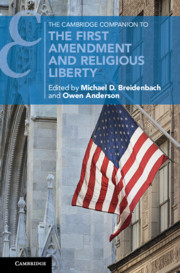Book contents
- The Cambridge Companion to the First Amendment and Religious Liberty
- Cambridge Companions to Law
- The Cambridge Companion to the First Amendment and Religious Liberty
- Copyright page
- Dedication
- Contents
- Notes on Contributors
- Acknowledgments
- Introduction
- Part I Philosophical Foundations
- Part II Historical Interpretations
- Part III Law, Politics, and Economics
- 9 Religious and Secular Presuppositions in First Amendment Interpretations
- 10 Two Concepts of Religious Liberty
- 11 The Economic Origins of Religious Liberty
- 12 Corporate Religious Liberty and the Culture Wars
- 13 Which Original Meaning of the Establishment Clause Is the Right One?
- 14 The Two Separations
- 15 The Challenge Ahead
- Index
12 - Corporate Religious Liberty and the Culture Wars
from Part III - Law, Politics, and Economics
Published online by Cambridge University Press: 17 December 2019
- The Cambridge Companion to the First Amendment and Religious Liberty
- Cambridge Companions to Law
- The Cambridge Companion to the First Amendment and Religious Liberty
- Copyright page
- Dedication
- Contents
- Notes on Contributors
- Acknowledgments
- Introduction
- Part I Philosophical Foundations
- Part II Historical Interpretations
- Part III Law, Politics, and Economics
- 9 Religious and Secular Presuppositions in First Amendment Interpretations
- 10 Two Concepts of Religious Liberty
- 11 The Economic Origins of Religious Liberty
- 12 Corporate Religious Liberty and the Culture Wars
- 13 Which Original Meaning of the Establishment Clause Is the Right One?
- 14 The Two Separations
- 15 The Challenge Ahead
- Index
Summary
Although recent U.S. Supreme Court decisions respecting corporate religious liberty have been heavily criticized, this chapter argues that corporate religious freedom is not the novel or radical development that critics decry. What is new, rather, is an increasingly intense opposition to any special legal accommodation of religious commitments. Indeed, upon close examination, the familiar criticisms do not for the most part actually turn on anything peculiar to the corporate form. They are better understood as manifestations of an emerging, deep-seated opposition to the traditional American commitment to religious freedom as a distinctive legal right. And this opposition is itself part of a broader effort to repudiate the vestiges of an older religious or biblical conception of American community, as described in Robert Bellah’s influential scholarship on American “civil religion,” in favor of a different conception that we might describe as “secular” or “progressive.”
Keywords
- Type
- Chapter
- Information
- Publisher: Cambridge University PressPrint publication year: 2020

